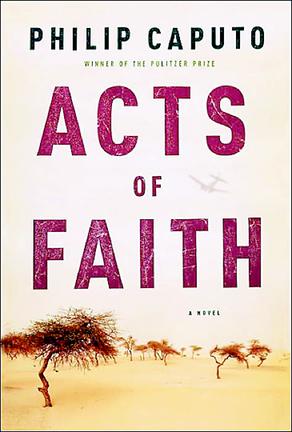Over the years, Caputo has published five novels based on these experiences, turning out some of the most interesting adventure-driven literary fiction of the past two decades. Acts of Faith, his latest big-block V-8 of a novel, might just be his most ambitious book yet.
Like Norman Rush’s Mating and Mortals, the novel casts the romantic and interpersonal wrangling of a cast of Westerners against the turmoil of Africa. If Jane Austen and Botswana were Rush’s inspirations, Joseph Conrad and the U.N. failure in northern Africa are on the table here.
The action unfolds before the backdrop of Sudan’s grueling and costly civil war, which reached a peak in the '90s, when the Khartoum-backed Muslim government took to bombing parts of the Christian or animist south. The UN was not very effective at relieving this humanitarian crisis, given its fear of armed intervention and troop loss, not to mention America’s boondoggle in Somalia.
Into this breach step characters like Douglas Braithwaite, a swaggering American aviator who claims to have flown in the first Gulf War and wants to bring that expertise to bear on the current quagmire. His idea is to create an airline that will fly humanitarian aid into regions where the UN won’t go—and make money at it, of course. “Doug was willing to do almost anything,” thinks one of his pilots, “only after he persuaded himself that it was for the greater good of the human race.”
As in his other novels, from Delcorso's Gallery to Horn of Africa, the warping of good intentions is Caputo's great subject here, and romantic interactions only complicate things further. One of Braithwaite’s partners, a multiethnic former Kenyan soccer star named Fitzhugh Martin, falls in love with a white Anglo Kenyan whose family’s money backs the whole enterprise. Later, an evangelical from Iowa named Quinette Hardin falls in love with and marries a leader from the People’s Liberation Army and becomes a passionate believer in armed resistance. Suddenly, to Quinette and to others, shipments of food and medical supplies don’t feel like enough.
This question of what is enough intervention, and what visitation rights Westerners assume around the world, is something Caputo has been chewing on for three decades now. The concern first came to him, as it did to much of the American left, through Vietnam, where Caputo wound up as a general enlist marine in the '60s. Over three years of service, however, Caputo watched himself transform from a gung-ho adventure-seeker into a ruthless killer, an evolution he chronicled in his classic memoir of Vietnam, A Rumor of War.
Acts of Faith seems destined to be just as much of a generation-defining book. If A Rumor of War painted a blisteringly intimate portrait of an American awakening to the moral complications of doing his patriotic duty, Acts of Faith examines the benevolence—and moral complexity—of any kind of intervention in foreign affairs, even when motivated by the idea of doing good.
What's impressive about Acts of Faith is that Caputo manages to get us thinking about these issues without ever shoehorning a lecture into each chapter. Like Russell Banks' recent novel, The Darling, he braids history into the narrative without us even realizing it, allowing it to rise up in the consequences to characters' actions, rather than the tenor or texture of their speech.
As a result, Acts of Faith is probably Caputo's most freewheeling and deliciously crafted book yet. The sentences come fast and furious, like haymakers from on high. Subtlety is not the strongest key in his register, but then again, Africa is not a subtle place. It's a continent where the sun rises “without any gradual color-splashed ascent, just an abrupt burst of equatorial light.” This image also aptly describes what seems likely to happen to Caputo's star after this virtuoso performance—it might just shoot right into the sky.









